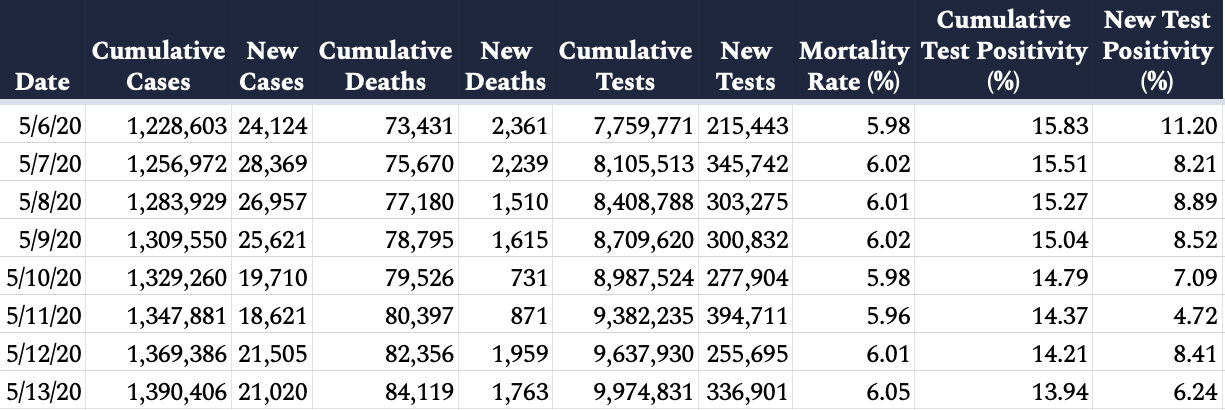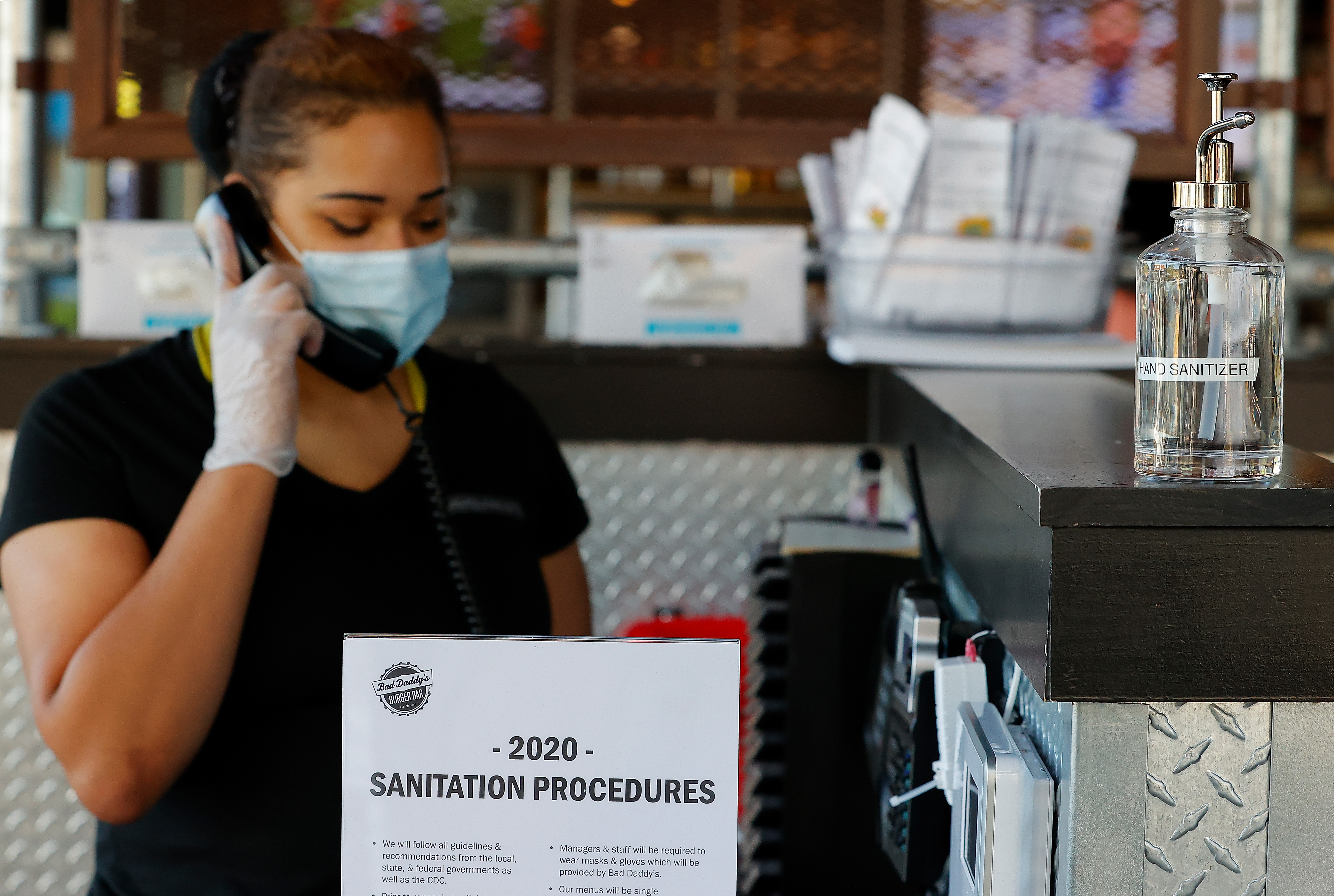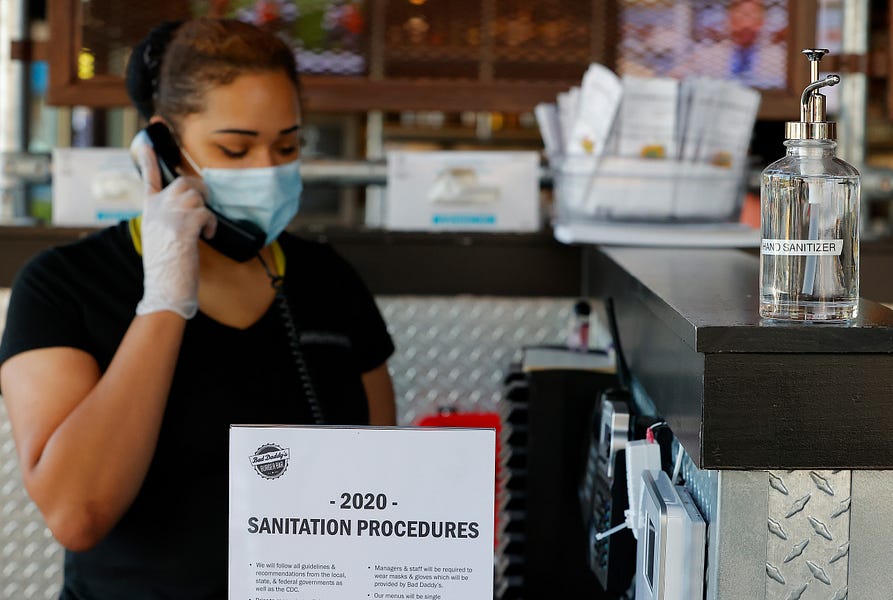Happy Thursday! D.C. extended its stay-at-home order until June 8, so your Morning Dispatchers will continue to have nothing but time to produce quality content for you.
Quick Hits: Today’s Top Stories
-
As of Wednesday night, there have now been 1,390,406 confirmed cases of COVID-19 in the United States (an increase of 21,020/1.5 percent from yesterday) and 84,119 deaths attributed to the virus (an increase of 1,763/2.1 percent from yesterday), according to the Johns Hopkins University COVID-19 Dashboard, leading to a mortality rate among confirmed cases of 6.1 percent (the true mortality rate is likely lower, but it’s impossible to determine precisely due to incomplete testing regimens). Of 9,974,831 coronavirus tests conducted in the United States (336,901 conducted since yesterday), 13.9 percent have come back positive.


-
The Dow Jones slumped 500 points Wednesday after remarks from Federal Reserve Chairman Jerome Powell suggesting that protecting the economy from long-term damage due to the coronavirus pandemic would likely require a further infusion of stimulus from Congress.
-
Federal law enforcement agents seized a cellphone belonging to Sen. Richard Burr Wednesday night as part of their effort to examine whether he improperly used insider knowledge to dump stocks in advance of the crash brought on by the coronavirus pandemic.
-
Despite the Justice Department’s move to drop the prosecution of former Trump National Security Adviser Michael Flynn, who previously pleaded guilty to lying to the FBI, the case appears not to be quite over yet: The federal judge presiding over the case is mulling the question of whether Flynn should be charged with criminal contempt for perjury.
-
Meanwhile, new information continues to come to light about the genesis of the investigation into Flynn: Newly released documents show that then-Vice President Joe Biden was one of the more than a dozen Obama officials who requested the “unmasking” that eventually revealed Flynn had been in communication with foreign agents in late 2016.
-
Presumptive Democratic 2020 nominee Joe Biden is working with erstwhile rival Bernie Sanders to create “unity” task forces to shape the party’s agenda going into the election this year.
-
The Wisconsin Supreme Court struck down—in a 4-3 decision—Gov. Tony Evers’ extension of a stay-at-home order intended to limit the spread of COVID-19. “In the case of a pandemic, which lasts month after month, the Governor cannot rely on emergency powers indefinitely,” the justices wrote.
-
President Trump’s former campaign chairman Paul Manafort, who was sentenced to more than seven years in prison on tax and bank fraud charges last year, has been released to home confinement due to the threat of COVID-19.
Checking Back In on Georgia

Late last month, Georgia became one of the first states in the country—along with South Carolina, Tennessee, and Colorado—to announce a gradual loosening of coronavirus restrictions. “In the same way that we carefully closed businesses and urged operations to end to mitigate the virus’ spread, today, we are announcing plans to incrementally—and safely—reopen sectors of our economy,” Gov. Brian Kemp said on April 20. Gyms, bowling alleys, tattoo parlors, barbers, and salons were allowed to resume operations—if they adhered to strict safety protocols—four days later, while movie theaters and dine-in restaurants had to wait a full week.
Coronavirus cases—and particularly deaths—are lagging indicators in measuring the spread of an outbreak, because it can take up to two weeks after transmission for an infected person to show symptoms of the virus, and weeks more for them to die of complications. But in the early going, Georgia has not seen the spike in new cases that critics of Kemp’s action had feared. Rather, the state’s curve has remained rather flat, declining ever so slightly. In the seven days leading up to May 6, the state confirmed an average of 732 cases per day. By the same metric a week later, 662.

(Data from The COVID Tracking Project. Analysis by The Dispatch.)
What has gotten worse since April 24, however, is Gov. Kemp’s popularity in the state. A Cygnal survey of 591 likely voters (+/- 4 percent margin of error) taken between April 25 and April 27 found 54 percent disapproved of how Kemp was handling the pandemic, and 58 percent said the state was easing restrictions too quickly. A Washington Post/Ipsos poll of 219 Georgians (+/- 7.5 percent margin of error) from April 27 to May 4 found just 39 percent approved of Kemp’s handling of the coronavirus outbreak—by 18 points, the lowest of all governors included in the survey—and 61 percent disapproved. Similarly, 65 percent believed the state was lifting restrictions too quickly.
In the days after Kemp’s announcement, Declan reached out to nearly 20 small businesses across Georgia to see if they were planning to reopen as soon as permitted. None told him they were.
Yesterday, he checked back in with some of the business owners he’d reached.
Shamrock Bowling Center in Dublin, Georgia—a town of about 15,000—didn’t reopen immediately, and Michelle Roland, who manages the lanes with her stepdad, was worried her customers would be angry. They weren’t—dozens shared supportive messages on Shamrock’s Facebook page. “You have our full support on the decision! And we look forward to seeing y’all when you are ready,” one read.
They are now ready. Shamrock reopened for business Tuesday, utilizing every other lane and sanitizing both lanes and balls after each use. They’re still serving food—but only in to-go boxes—and the arcade remains closed.
“So far it’s been very slow,” Roland told The Dispatch. She added it’s been very difficult to stock up on cleaning and protective equipment, but that, after most of the bowling alley’s workers had to file for unemployment, she was able to hire all the employees back she needed.
“We have plenty of hand sanitizer and are only using every other lane so y’all come on out if you feel safe!“ Shamrock’s latest Facebook post reads. “We are so excited to get back into the swing of things and hope you will join us!”
Porch Light Latin Kitchen in Smyrna is another story.
“With restaurants having such thin margins, being able to open to the public at just 20 percent doesn’t really cut it,” Porch Light’s owner Andre Gomez told The Dispatch, explaining why he hasn’t opened up his dining room. Under Georgia’s reopening guidelines, restaurants can hold no more than 10 patrons per 300 square feet of space. For Porch Light, that means about 12 customers at a time. So it’s forged ahead with take-out only. “Reduced staff, reduced menu, obviously reduced sales,” Gomez said. “But at the moment, enough to keep us operating.”
He’s considering allowing guests to rent out the whole restaurant for private dinners, and is waiting to hear back from his landlord about moving some tables outside or into the parking lot. But single-use menus, plasticware, masks—the additional costs for a restaurant aren’t nothing. Though for Gomez, it’s more than just a financial decision.
“At the end of the day … when you come into a restaurant, you want to feel welcome,” he said. “And if you walk into a place and there’s somebody wearing a mask and a glove, you don’t really feel welcome. I’m sorry, but it’s not very hospitable. It’s very hospital-like, but not hospitable.”
When asked what needs to happen for him to resume dine-in service, he said he’d like to be able to seat customers at 70 percent capacity and reopen his bar. But he added that his guests need to feel comfortable, and his employees do too. “I can’t force them to work,” he said. “I’ve heard from a lot of people … that some of their employees are making more money on their unemployment than they would if they were working.”
“So I mean, there are so many factors. … It’s more than X, Y, and Z—it’s probably like the whole alphabet.”
Well, Isn’t That Special
Joe Biden continues to hold about a six-point lead over Donald Trump in national polls. In fact, according to one analysis, Biden’s lead “is the steadiest in a race with an incumbent running since at least 1944.”
But we don’t hold a national election, and the results in battleground states often tell a different story. In a CNN poll of adults in 15 battleground states released yesterday, Trump was outperforming Biden 52 percent to 45 percent.
And that’s why Tuesday’s special election in California’s 25th congressional district is interesting. The suburban district had been safely Republican since 1992, but Hillary Clinton carried it by seven points in 2016, and Katie Hill won it in 2018 by nine. But Republican Mike Garcia was declared the winner and was leading by 12 points with just more than 80 percent of precincts reporting, marking the first time since 1998 a Republican flipped a House seat in California.
The surprising election results, however, may not be the electoral bellwether for Trump’s re-election that his campaign is claiming.
First, special elections are, well, special. They attract fewer voters and often the most habitual voters, who on the whole tend to be older, whiter, and more conservative. So it’s always a little hard to make big, sweeping predictions about a presidential race that will have about 65 percent of registered voters casting a ballot, compared to Tuesday’s turnout, which was probably closer to 40 percent.
Second, this was no normal special election. In the midst of a pandemic, California mailed ballots to all 425,000 registered voters in the district. They opened nine voting centers but also offered more than 25 vote-by-mail drop boxes across the district. In-person voting, as expected, was very low.
More than a referendum on Trump, then, this election offers tantalizing details about what a heavy mail-in ballot system may look like in November. No doubt, Republicans, who have been wary of mail-in ballots, will be pouring over the data to see what types of voters increased their voting propensity under the new system and what advantage it may give to either side this November.
Republicans also won a special election to replace Sean Duffy, the Wisconsin representative who retired last year. State Sen. Tom Tiffany easily won the rural district, which Trump carried by 20 points in 2016.
* We hope you get this reference, but for our Gen-Z voters unfamiliar with the full Dana Carvey catalog out there, try this.
Worth Your Time
-
Over at Vox, we find this list of the seven major coronavirus policy proposals experts are pushing to help us get through the rest of 2020 as healthily as possible. We have our quibbles and we’d take issue with proposal number seven, which suggests that the government can happily take on nigh-infinite amounts of new debt to battle the crisis since interest rates are, for now, very low. But it’s a good, interesting, and informative read nonetheless.
-
What is the healthiest way to live through a crisis? Maybe by trying to tune out the struggles of the far-off powerful and applying oneself to the specific problems of one’s own community. Bill Kauffman suggests as much in this essay for The American Conservative, which doubles as a retrospective review of Josephine Young Case’s 1938 blank-verse poem A Midnight on the 31st of March, in which the residents of a small town are suddenly, wholly, and irrevocably cut off from the outside world: “In Saugersville, 11 months into the isolation, a young man of learning and ambition who chafes under the new dispensation has an epiphany as he skis the sloping fields outside the village. ‘I am alive and this is where I live.’ The realization fills him with joy and gratitude. May we in these strange days experience our own revelations.”
-
In yesterday’s Morning Dispatch, we briefly touched on the news of a horrific terror attack on a maternity clinic in Kabul, Afghanistan. This New York Times story by Mujib Mashal details the heartbreaking clerical and logistical work of the aftermath: Newly motherless babies transferred to a nearby hospital, family members having to bury their dead and scrounge up the right paperwork to claim their newborn relatives in the same day, women pacing the halls trying to find out if there were any unclaimed infants to adopt.
Something Fun
You had us at “Dogs on Zoom.”
Presented Without Comment
Toeing the Company Line
-
Jonah’s midweek G-File (🔒) takes on the notion, newly popular in some factions of the right, that widespread wearing of masks in public is a mark of unbearable weakness or cowardice. After that, he examines a larger question: Are the anti-maskers really as sincere in their folk-libertarian anti-mask zealotry as they seem, or is this just the latest battle to be waged in the eternal culture war?
-
This week’s ISIS-involved terror attacks in Afghanistan have been jarring. But in his latest Vital Interests newsletter, Tom Joscelyn reminds us that the preeminent driver of unrest and brutality in that country remains the Taliban—and walks us through how the State Department is deluding itself into thinking that group can be a genuine partner, despite all evidence to the contrary, in its haste to pull U.S. forces out of Afghanistan as soon as possible.
-
Start your eardrums: There’s a new Dispatch Podcast for your listening pleasure. In the latest episode, Sarah, Jonah, and David discuss Joe Biden’s lead in the polls, the special election in California, what “Obamagate” is, and the future of social distancing and the coronavirus.
Let Us Know
Here’s a serious one for you: As the pandemic plods on, we’ve gone back and forth about how single-mindedly we should pursue what is undeniably the story of our time. On the one hand, we don’t want to beat you insensate with information about the same thing every single day, and we certainly don’t want other stories to get lost in the shuffle. On the other, this is a huge, complicated pandemic that is still developing very fast, and we want to make sure you’re kept up to speed on it.
Have we struck a good balance? Have we leaned too far one way or the other? What do you think?
Reporting by Declan Garvey (@declanpgarvey), Andrew Egger (@EggerDC), Sarah Isgur (@whignewtons), and Steve Hayes (@stephenfhayes).
Photograph by Kevin C. Cox/Getty Images.







Please note that we at The Dispatch hold ourselves, our work, and our commenters to a higher standard than other places on the internet. We welcome comments that foster genuine debate or discussion—including comments critical of us or our work—but responses that include ad hominem attacks on fellow Dispatch members or are intended to stoke fear and anger may be moderated.
With your membership, you only have the ability to comment on The Morning Dispatch articles. Consider upgrading to join the conversation everywhere.